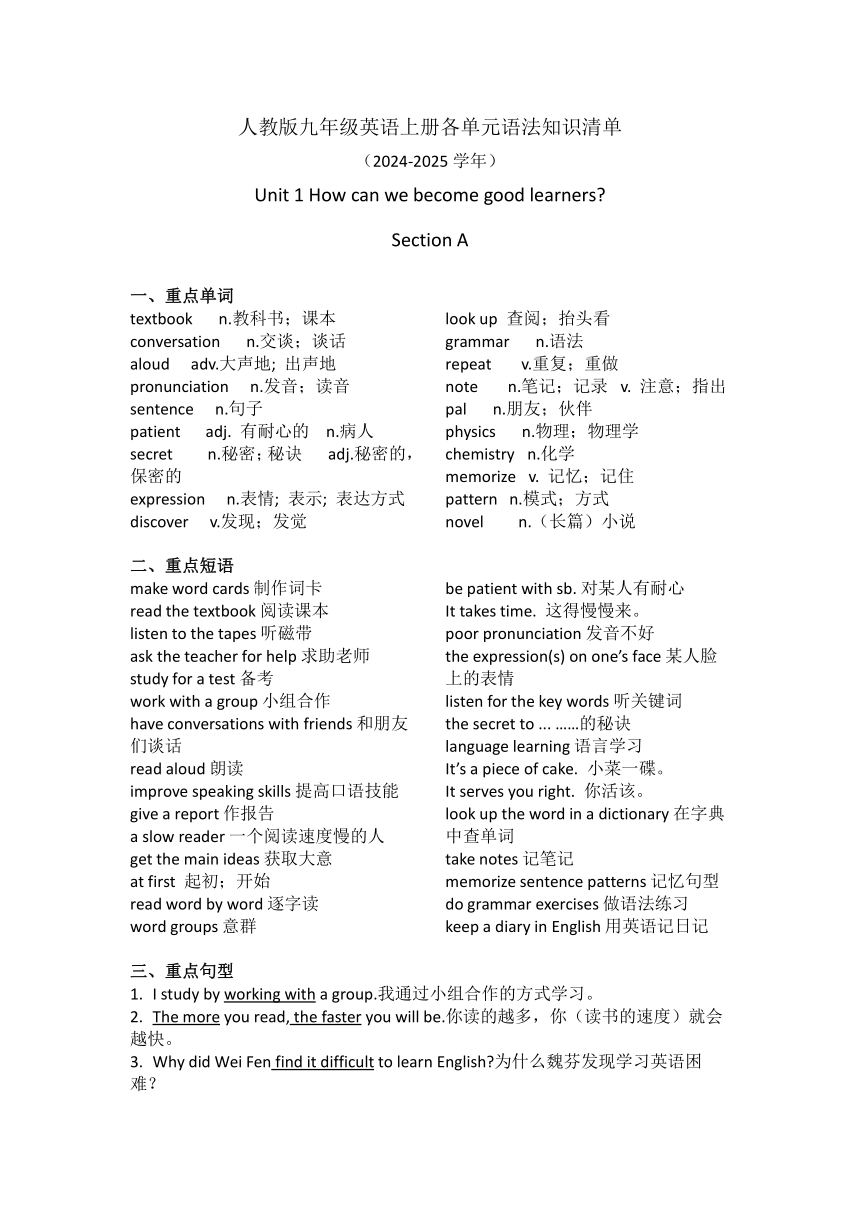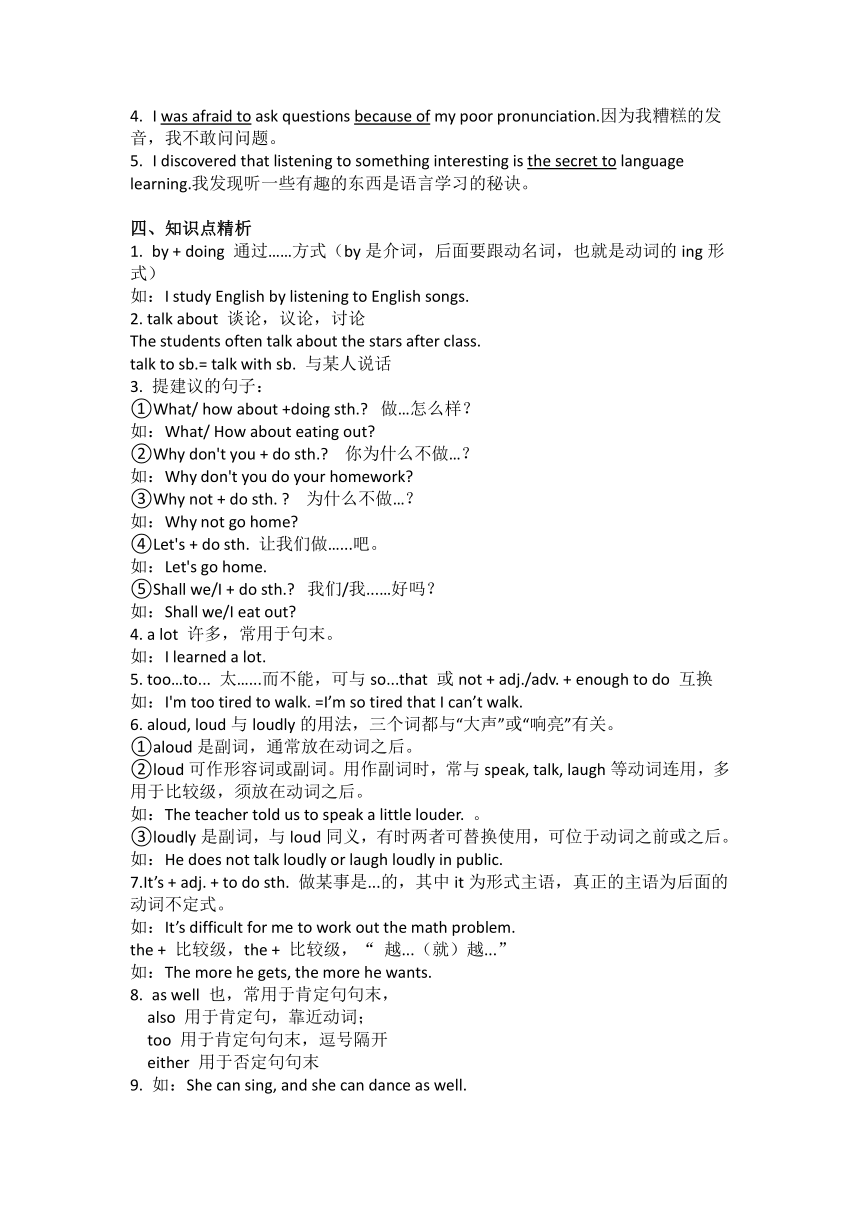人教新目标(Go for it)版九年级全册Unit 1 How can we become good learners?单元语法知识清单
文档属性
| 名称 | 人教新目标(Go for it)版九年级全册Unit 1 How can we become good learners?单元语法知识清单 |

|
|
| 格式 | docx | ||
| 文件大小 | 26.0KB | ||
| 资源类型 | 教案 | ||
| 版本资源 | 人教新目标(Go for it)版 | ||
| 科目 | 英语 | ||
| 更新时间 | 2024-09-11 00:00:00 | ||
图片预览


文档简介
人教版九年级英语上册各单元语法知识清单
(2024-2025学年)
Unit 1 How can we become good learners
Section A
重点单词
textbook n.教科书;课本
conversation n.交谈;谈话
aloud adv.大声地; 出声地
pronunciation n.发音;读音
sentence n.句子
patient adj. 有耐心的 n.病人
secret n.秘密;秘诀 adj.秘密的,保密的
expression n.表情; 表示; 表达方式
discover v.发现;发觉
look up 查阅;抬头看
grammar n.语法
repeat v.重复;重做
note n.笔记;记录 v. 注意;指出
pal n.朋友;伙伴
physics n.物理;物理学
chemistry n.化学
memorize v. 记忆;记住
pattern n.模式;方式
novel n.(长篇)小说
重点短语
make word cards 制作词卡
read the textbook 阅读课本
listen to the tapes 听磁带
ask the teacher for help 求助老师
study for a test 备考
work with a group 小组合作
have conversations with friends 和朋友们谈话
read aloud 朗读
improve speaking skills 提高口语技能
give a report 作报告
a slow reader 一个阅读速度慢的人
get the main ideas 获取大意
at first 起初;开始
read word by word 逐字读
word groups 意群
be patient with sb. 对某人有耐心
It takes time. 这得慢慢来。
poor pronunciation 发音不好
the expression(s) on one’s face 某人脸上的表情
listen for the key words 听关键词
the secret to ... ……的秘诀
language learning 语言学习
It’s a piece of cake. 小菜一碟。
It serves you right. 你活该。
look up the word in a dictionary 在字典中查单词
take notes 记笔记
memorize sentence patterns 记忆句型
do grammar exercises 做语法练习
keep a diary in English 用英语记日记
重点句型
I study by working with a group.我通过小组合作的方式学习。
The more you read, the faster you will be.你读的越多,你(读书的速度)就会越快。
Why did Wei Fen find it difficult to learn English 为什么魏芬发现学习英语困难?
I was afraid to ask questions because of my poor pronunciation.因为我糟糕的发音,我不敢问问题。
I discovered that listening to something interesting is the secret to language learning.我发现听一些有趣的东西是语言学习的秘诀。
知识点精析
by + doing 通过……方式(by是介词,后面要跟动名词,也就是动词的ing形式)
如:I study English by listening to English songs.
2. talk about 谈论,议论,讨论
The students often talk about the stars after class.
talk to sb.= talk with sb. 与某人说话
3. 提建议的句子:
①What/ how about +doing sth. 做…怎么样?
如:What/ How about eating out
②Why don't you + do sth. 你为什么不做…?
如:Why don't you do your homework
③Why not + do sth. 为什么不做…?
如:Why not go home
④Let's + do sth. 让我们做…...吧。
如:Let's go home.
⑤Shall we/I + do sth. 我们/我...…好吗?
如:Shall we/I eat out
4. a lot 许多,常用于句末。
如:I learned a lot.
5. too…to... 太…...而不能,可与so...that 或not + adj./adv. + enough to do 互换
如:I'm too tired to walk. =I’m so tired that I can’t walk.
6. aloud, loud与loudly的用法,三个词都与“大声”或“响亮”有关。
①aloud是副词,通常放在动词之后。
②loud可作形容词或副词。用作副词时,常与speak, talk, laugh等动词连用,多用于比较级,须放在动词之后。
如:The teacher told us to speak a little louder. 。
③loudly是副词,与loud同义,有时两者可替换使用,可位于动词之前或之后。
如:He does not talk loudly or laugh loudly in public.
7.It’s + adj. + to do sth. 做某事是...的,其中it为形式主语,真正的主语为后面的动词不定式。
如:It’s difficult for me to work out the math problem.
the + 比较级,the + 比较级,“ 越...(就)越...”
如:The more he gets, the more he wants.
as well 也,常用于肯定句句末,
also 用于肯定句,靠近动词;
too 用于肯定句句末,逗号隔开
either 用于否定句句末
如:She can sing, and she can dance as well.
She can sing, and she can also dance.
She can sing, and she can also dance.
She can sing and she can dance, too.
He doesn’t like playing games, I don’t like it, either.
Section B
重点单词
pronounce v.发音
increase v.增加;增长
speed n. 速度
review v. & n. 回顾;复习
partner n.搭档;同伴
born v.出生 adj.天生的
be born with 表生具有
ability n.能力;才能
create v. 创造;创建
brain n.大脑
active adj.活跃的;积极的
attention n.注意;关注
pay attention to 注意;关注
connect (使)连接;与…有联系
connect...with 把…...和…...连接或联系起来
overnight adv.一夜之间;在夜间
knowledge n.知识;学问
lifelong adj.终身的;毕生的
wisely adj. 明智地;聪明地
重点短语
increase reading speed 提高阅读速度
make mistakes in grammar 在语法方面犯错
be born with ... 天生具有……
the ability to learn 学习的能力
depend on 取决于;依赖
learning habits 学习习惯
have ... in common 有……共同之处
create an interest in ... 对……产生兴趣
pay attention to 注意;关注
connect ... with ... 把……和……连接或联系起来
learn from mistakes 从错误中学习
Use it or lose it. 非用即失。
Practice makes perfect. 熟能生巧。
develop study skills 培养学习技能
write down 写下;记下
look for ways to review 寻找复习的方法
Knowledge comes from questioning. 知识源于质疑。
explain sth. to sb.向某人解释某事
bit by bit 一点一点地
instead of 代替;反而
重点句型
1. I don't know how to increase my reading speed.我不知道怎样提高我的阅读速度。
2. Everyone is born with the ability to learn. 每个人都天生具有学习的能力。
3. But whether or not you can do this well depends on your learning habits.但是你是否能把这做好取决于你的学习习惯。
4. Even if you learn something well, you will forget it unless you use it.即使有些东西你学得很好,除非你使用它,否则你就会忘记。
5. Practice makes perfect.熟能生巧。
6. Knowledge comes from questioning. 知识源于质疑。
7. Learning is a lifelong journey because every day brings something new.学习是一段终生的旅程,因为每天都会带来新的东西。
四、知识点精析
1. how to increase 是“疑问词+动词不定式”结构。疑问词 what、which、how、when、where、whether 等后面可接动词不定式,构成“疑问词+动词不定式”结构,在句中常用作主语、表语或宾语。宾语从句的主语和主句的主语相同时,宾语从句可以与该结构互换。该句可转换力“I don't know how I can increase my
reading speed"
How to use the computer is a question.
怎样使用计算机是个问题。(作主语)
The question is when to start.
问题是何时开始。(作表语)
Could you tell me what to write in this letter
你能告诉我在这封信里写什么吗?(作宾语)
mistake 的相关短语:
make mistakes 犯错误 by mistake 错误地;无意中
mistake…for.. 把 错当成
He often makes mistakes in math.
I left him outside of the house by mistake.
She mistook him for the professor.
whether or not 或 whether...or not意为“是否…”
Whether or not he will come is still a secret.
Our success depends on whether everyone works hard or not.
depend on 依靠;信赖;取决于
Whether we'll go camping depends on the weather.
pay attention to 意为“注意;关注”。其中to为介词,其后可跟名词、代词或动词-ing形式。
We must pay attention to protecting the environment.
(2024-2025学年)
Unit 1 How can we become good learners
Section A
重点单词
textbook n.教科书;课本
conversation n.交谈;谈话
aloud adv.大声地; 出声地
pronunciation n.发音;读音
sentence n.句子
patient adj. 有耐心的 n.病人
secret n.秘密;秘诀 adj.秘密的,保密的
expression n.表情; 表示; 表达方式
discover v.发现;发觉
look up 查阅;抬头看
grammar n.语法
repeat v.重复;重做
note n.笔记;记录 v. 注意;指出
pal n.朋友;伙伴
physics n.物理;物理学
chemistry n.化学
memorize v. 记忆;记住
pattern n.模式;方式
novel n.(长篇)小说
重点短语
make word cards 制作词卡
read the textbook 阅读课本
listen to the tapes 听磁带
ask the teacher for help 求助老师
study for a test 备考
work with a group 小组合作
have conversations with friends 和朋友们谈话
read aloud 朗读
improve speaking skills 提高口语技能
give a report 作报告
a slow reader 一个阅读速度慢的人
get the main ideas 获取大意
at first 起初;开始
read word by word 逐字读
word groups 意群
be patient with sb. 对某人有耐心
It takes time. 这得慢慢来。
poor pronunciation 发音不好
the expression(s) on one’s face 某人脸上的表情
listen for the key words 听关键词
the secret to ... ……的秘诀
language learning 语言学习
It’s a piece of cake. 小菜一碟。
It serves you right. 你活该。
look up the word in a dictionary 在字典中查单词
take notes 记笔记
memorize sentence patterns 记忆句型
do grammar exercises 做语法练习
keep a diary in English 用英语记日记
重点句型
I study by working with a group.我通过小组合作的方式学习。
The more you read, the faster you will be.你读的越多,你(读书的速度)就会越快。
Why did Wei Fen find it difficult to learn English 为什么魏芬发现学习英语困难?
I was afraid to ask questions because of my poor pronunciation.因为我糟糕的发音,我不敢问问题。
I discovered that listening to something interesting is the secret to language learning.我发现听一些有趣的东西是语言学习的秘诀。
知识点精析
by + doing 通过……方式(by是介词,后面要跟动名词,也就是动词的ing形式)
如:I study English by listening to English songs.
2. talk about 谈论,议论,讨论
The students often talk about the stars after class.
talk to sb.= talk with sb. 与某人说话
3. 提建议的句子:
①What/ how about +doing sth. 做…怎么样?
如:What/ How about eating out
②Why don't you + do sth. 你为什么不做…?
如:Why don't you do your homework
③Why not + do sth. 为什么不做…?
如:Why not go home
④Let's + do sth. 让我们做…...吧。
如:Let's go home.
⑤Shall we/I + do sth. 我们/我...…好吗?
如:Shall we/I eat out
4. a lot 许多,常用于句末。
如:I learned a lot.
5. too…to... 太…...而不能,可与so...that 或not + adj./adv. + enough to do 互换
如:I'm too tired to walk. =I’m so tired that I can’t walk.
6. aloud, loud与loudly的用法,三个词都与“大声”或“响亮”有关。
①aloud是副词,通常放在动词之后。
②loud可作形容词或副词。用作副词时,常与speak, talk, laugh等动词连用,多用于比较级,须放在动词之后。
如:The teacher told us to speak a little louder. 。
③loudly是副词,与loud同义,有时两者可替换使用,可位于动词之前或之后。
如:He does not talk loudly or laugh loudly in public.
7.It’s + adj. + to do sth. 做某事是...的,其中it为形式主语,真正的主语为后面的动词不定式。
如:It’s difficult for me to work out the math problem.
the + 比较级,the + 比较级,“ 越...(就)越...”
如:The more he gets, the more he wants.
as well 也,常用于肯定句句末,
also 用于肯定句,靠近动词;
too 用于肯定句句末,逗号隔开
either 用于否定句句末
如:She can sing, and she can dance as well.
She can sing, and she can also dance.
She can sing, and she can also dance.
She can sing and she can dance, too.
He doesn’t like playing games, I don’t like it, either.
Section B
重点单词
pronounce v.发音
increase v.增加;增长
speed n. 速度
review v. & n. 回顾;复习
partner n.搭档;同伴
born v.出生 adj.天生的
be born with 表生具有
ability n.能力;才能
create v. 创造;创建
brain n.大脑
active adj.活跃的;积极的
attention n.注意;关注
pay attention to 注意;关注
connect (使)连接;与…有联系
connect...with 把…...和…...连接或联系起来
overnight adv.一夜之间;在夜间
knowledge n.知识;学问
lifelong adj.终身的;毕生的
wisely adj. 明智地;聪明地
重点短语
increase reading speed 提高阅读速度
make mistakes in grammar 在语法方面犯错
be born with ... 天生具有……
the ability to learn 学习的能力
depend on 取决于;依赖
learning habits 学习习惯
have ... in common 有……共同之处
create an interest in ... 对……产生兴趣
pay attention to 注意;关注
connect ... with ... 把……和……连接或联系起来
learn from mistakes 从错误中学习
Use it or lose it. 非用即失。
Practice makes perfect. 熟能生巧。
develop study skills 培养学习技能
write down 写下;记下
look for ways to review 寻找复习的方法
Knowledge comes from questioning. 知识源于质疑。
explain sth. to sb.向某人解释某事
bit by bit 一点一点地
instead of 代替;反而
重点句型
1. I don't know how to increase my reading speed.我不知道怎样提高我的阅读速度。
2. Everyone is born with the ability to learn. 每个人都天生具有学习的能力。
3. But whether or not you can do this well depends on your learning habits.但是你是否能把这做好取决于你的学习习惯。
4. Even if you learn something well, you will forget it unless you use it.即使有些东西你学得很好,除非你使用它,否则你就会忘记。
5. Practice makes perfect.熟能生巧。
6. Knowledge comes from questioning. 知识源于质疑。
7. Learning is a lifelong journey because every day brings something new.学习是一段终生的旅程,因为每天都会带来新的东西。
四、知识点精析
1. how to increase 是“疑问词+动词不定式”结构。疑问词 what、which、how、when、where、whether 等后面可接动词不定式,构成“疑问词+动词不定式”结构,在句中常用作主语、表语或宾语。宾语从句的主语和主句的主语相同时,宾语从句可以与该结构互换。该句可转换力“I don't know how I can increase my
reading speed"
How to use the computer is a question.
怎样使用计算机是个问题。(作主语)
The question is when to start.
问题是何时开始。(作表语)
Could you tell me what to write in this letter
你能告诉我在这封信里写什么吗?(作宾语)
mistake 的相关短语:
make mistakes 犯错误 by mistake 错误地;无意中
mistake…for.. 把 错当成
He often makes mistakes in math.
I left him outside of the house by mistake.
She mistook him for the professor.
whether or not 或 whether...or not意为“是否…”
Whether or not he will come is still a secret.
Our success depends on whether everyone works hard or not.
depend on 依靠;信赖;取决于
Whether we'll go camping depends on the weather.
pay attention to 意为“注意;关注”。其中to为介词,其后可跟名词、代词或动词-ing形式。
We must pay attention to protecting the environment.
同课章节目录
- Unit 1 How can we become good learners.
- Section A
- Section B
- Unit 2 I think that mooncakes are delicious!
- Section A
- Section B
- Unit 3 Could you please tell me where the restroom
- Section A
- Section B
- Unit 4 I used to be afraid of the dark.
- Section A
- Section B
- Unit 5 What are the shirts made of?
- Section A
- Section B
- Review of Units 1-5
- Unit 6 When was it invented?
- Section A
- Section B
- Unit 7 Teenagers should be allowed to choose their
- Section A
- Section B
- Unit 8 It must belong to Carla.
- Section A
- Section B
- Unit 9 I like music that I can dance to.
- Section A
- Section B
- Unit 10 You're supposed to shake hands.
- Section A
- Section B
- Review of Units 6-10
- Unit 11 Sad movies make me cry.
- Section A
- Section B
- Unit 12 Life is full of the unexpected
- Section A
- Section B
- Unit 13 We're trying to save the earth!
- Section A
- Section B
- Unit 14 I remember meeting all of you in Grade 7.
- Section A
- Section B
- Review of Units 11-14
